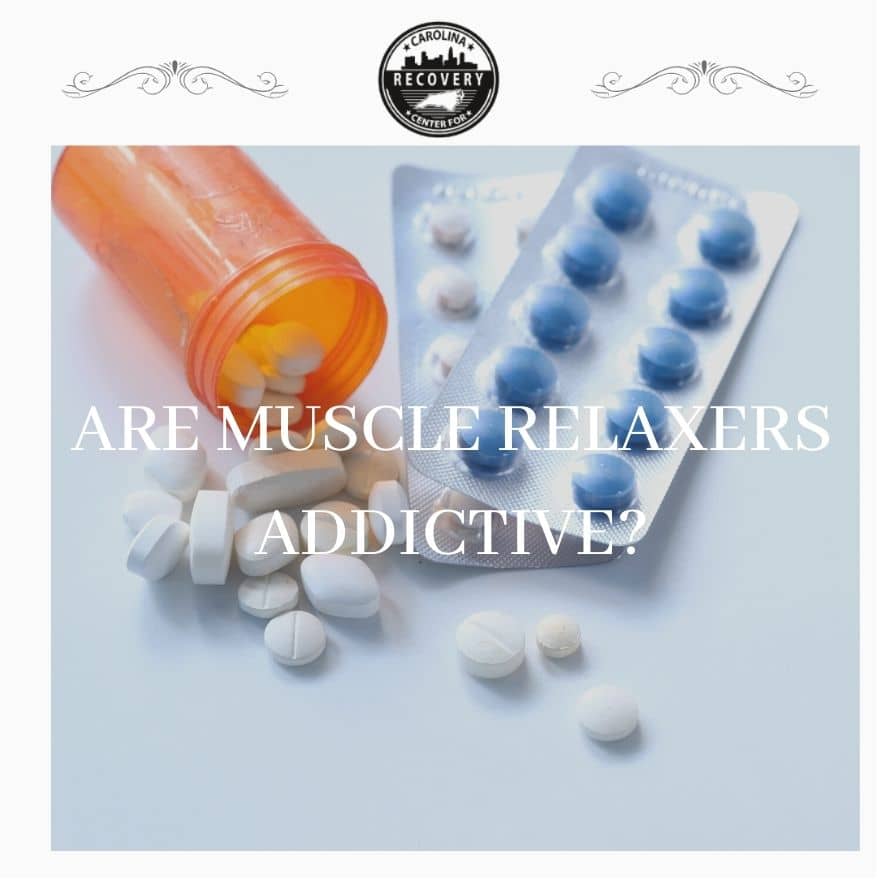Are Muscle Relaxers Addictive?

Medically Verified: 2/1/24
Medical Reviewer
Chief Editor

All of the information on this page has been reviewed and verified by a certified addiction professional.
Muscle relaxers are prescription medications that affect the central nervous system, causing the relaxation of muscles. Typically, these medications are prescribed to treat muscle pain, spasms, back pain, and neurological disorders. Muscle relaxers are addictive which is why they are only intended for short-term use.
There are several types of muscle relaxers that individuals can become dependent on. However, the most commonly abused is known as Soma (carisoprodol). According to the National Survey on Drug Use and Health, “2,276,000 U.S. residents aged 12 and older used Soma nonmedically at least once in their lifetime.”[1]
What are Muscle Relaxers?
Muscle relaxers are prescription drugs that help individuals suffering from conditions like cerebral palsy, spinal cord injuries, back pain, and multiple sclerosis cope with their pain. However, these medications only mask the symptoms of pain rather than treating the pain itself. In other words, muscle relaxers affect the brain instead of the body.
While these medications can be effective in soothing the symptoms of pain, they can also cause euphoric and pleasurable effects. Because of this, many individuals who take muscle relaxers become addicted to them.
The most commonly abused muscle relaxers include:
- Flexeril (cyclobenzaprine)
- Zanaflex (tizanidine)
- Lioresal (baclofen)
- Dantrium (dantrolene)
- Robaxin (methocarbamol)
- Soma (carisoprodol)
- Skelaxin (metaxalone)
- Paraflex (chlorzoxazone)
- Norflex (orphenadrine)
Some muscle relaxers work in different ways. For example, Baclofen, methocarbamol, cyclobenzaprine, and tizanidine affect the central nervous system (brain and spinal cord). On the other hand, dantrolene directly affects the muscles by blocking the release of calcium.
Why Do People Abuse Muscle Relaxers?
Muscle relaxers can cause intoxicating effects like a sense of calmness and rushes of euphoria. Carisoprodol, baclofen, methocarbamol, cyclobenzaprine, and tizanidine are known to depress the central nervous system (CNS). CNS depressants are commonly abused, as the intoxicating effects of these drugs can be desirable.
However, many individuals who abuse muscle relaxants combine them with other substances like opioids or alcohol to produce their desired high. This can be extremely dangerous, as the CNS becomes overly depressed. In other words, mixing muscle relaxants with opioids or alcohol can lead to a life-threatening overdose.
Lastly, some individuals abuse muscle relaxers because they have become tolerant of them. Once someone has been taking a muscle relaxer on a long-term basis, they will require more of the substance to produce the desired effect. This leads individuals to continually increase their dosage without notifying their doctor, eventually causing them to become addicted.
Are Muscle Relaxers Addictive?
Muscle relaxers are known to be habit-forming and extremely addictive. According to the Substance Abuse and Mental Health Administration, 1.7 million adults aged 12-25 misused muscle relaxants in 2018. Additionally, about 4.3 million adults aged 26 or older were past year abusers of muscle relaxants.[2]
While muscle relaxants are addictive on their own, most individuals who abuse them mix them with other substances to create a more potent effect.
The National Library of Medicine reports, “Although skeletal muscle relaxants are occasionally the primary drug of abuse, they are often used along with other central nervous system depressants, such as narcotics or alcohol.”[3]
Additionally, another study finds, “In 2011, an estimated 53,000 (emergency department) visits were caused by muscle relaxant misuse or abuse, and 18% of these cases involved concomitant alcohol consumption.”[4]
It is clear to see that muscle relaxants are, in fact, addictive. However, they can also be extremely dangerous, posing life-threatening consequences when mixed with other substances like alcohol or opioids.
Side Effects of Muscle Relaxer Abuse and Addiction
Muscle relaxer addiction is a serious condition that requires professional treatment. Oftentimes, the withdrawal symptoms associated with addiction to muscle relaxants are severe and potentially life-threatening.
Other side effects of muscle relaxer abuse include:
- Frequent tiredness and drowsiness
- Constant sedation
- Fatigue or weakness of muscles
- Dry mouth
- Depression
- Decreased blood pressure
- Irregular heartbeat
- Seizures and convulsions
- Disorientation
- Anxiety
- Psychosis
- Inflammation and swelling of the liver
- Low white blood cell count
- Paralysis
- Psychosis and hallucinations
- Coma
- Death
Individuals who are addicted to muscle relaxers are at an increased risk of experiencing an overdose. Individuals may take too many muscle relaxers or mix them with other drugs to experience an extreme effect. If someone is experiencing an overdose, emergency medical intervention is necessary.
Find Help for Yourself or an Addicted Loved One Today
Muscle relaxers are prescription drugs that are known to be habit-forming. If you or a loved one frequently abuse these medications, you may be suffering from a substance use disorder. Before you stop taking muscle relaxants, you must attend a professional detox program to avoid experiencing severe symptoms of withdrawal.
Addiction treatment facilities like Carolina Recovery Program can help you or your loved one overcome addiction. For more information on our individualized addiction treatment program, contact us today.
References:

